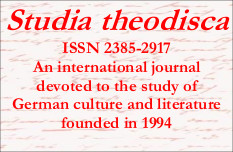«Was! um eines Wortes willen?». Hölderlin, Celan e la cesura tra poesia e ‘praxis’ nella storia
[«What? By dint of a mere word?». Hölderlin, Celan and the caesura between poetry and historical ‘praxis’]
DOI:
https://doi.org/10.13130/1593-2478/12315Abstract
The purpose of this article is to shed light on the complex relationship between poetry and praxis, which Hölderlin and Celan dealt with, respectively, in the tragedy Der Tod des Empedokles and in the poem Tübingen Jänner and, further, to show how the two poets were driven by the urge to reflect on the role of the poet in history. In the tragedy Der Tod des Empedokles, Hölderlin still seems to believe in the power of the poetic word, but he soon lost this faith and did not finish his drama. In Paul Celan’s poem Tübingen Jänner, Hölderlin becomes the symbol of a poetry which the world cannot understand any more. The obscure words «Pallaksch. Pallaksch», which the poet repeated in front of his visitors in the tower on the Neckar, suggest the impossible communication between poet and society and the caesura between the poetic word and historical praxis.
Published
Issue
Section
License
This journal allows the author(s) to hold the copyright without restrictions.
This journal allows the author(s) to retain publishing rights without restrictions.







